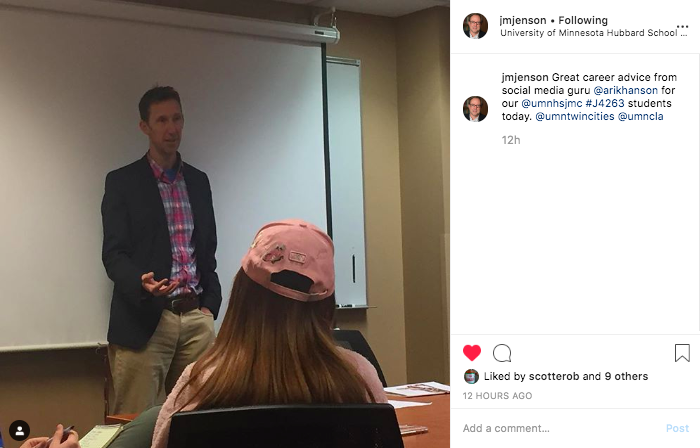Over the last week, I’ve spoke to two college classes about one hot topic: Personal branding. More specifically, how college seniors about to enter the workforce can build, nurture and sustain an effective personal brand online (photo credit below: Mark Jenson, professor, Hubbard School of Journalism and Mass Communication at the University of Minnesota).

It’s an area I do have some experience in. As a solo consultant, my personal brand is everything because, in essence, my personal brand = my reputation. Clients don’t necessarily buy “ACH Communications”–they buy Arik Hanson.
So, as I thought about the personal branding advice I’d give to a 22-year-old, I started thinking about the typical advice they receive in this area. And, I began to see that my advice kinda flew in the fact of many of those tips. For example:
Typical advice: “Clean up your social media accounts to establish a more professional online presence.”
In this NerdWallet post, one career expert said this: “inappropriate pictures or other online content can definitely harm a candidate’s chances, so it is important for students to gain control of their online presence and to have it reflect their professional identities.”
My advice: Double-down on posts and content that showcases your personality
While it’s definitely a good idea to clean up inappropriate content, I wouldn’t think about your social media accounts as your “professional identity.” I’d think about them as an extension of your whole self. After all, agencies and companies want to hire INTERESTING people–not buttoned-up, slick and polished robots. Your personality–whatever it is–should come through loud and clear in your social content. For me, over the years, that’s meant a heavy dose of family selfies, golf posts, craft beer shots and photos from KU, Gopher and Wolves games.
Typical advice: Utilize your LinkedIn profile
In this Forbes piece, one expert says: “LinkedIn is a great tool for those who are looking to brand themselves professionally, yet there are still young professionals who are not taking advantage. Keeping your profile up to date and relevant allows you to use LinkedIn as your own personal resume and cover letter that can be seen by thousands of potential employers.”
My advice: A polished LinkedIn profile is table-stakes for today’s 22-year-old–use LinkedIn as a research tool to find that first job instead
“Utilizing your LinkedIn profile” as personal branding advice is akin to telling a millennial that Instagram is a great brand marketing platform! Everyone knows that by now–and you better damn well have a polished LinkedIn profile by your junior year. What many college seniors don’t know is the power of LinkedIn as a research and networking tool. As a newly minted college grad, you won’t have much of a LinkedIn profile anyway. You won’t have much to say in terms of “thought leadership.” So, the best way to use the platform is to research the companies and people you want to work for–and then figure out how to get in front of them. For example, let’s say you wanted to get a social media job at Target. You start by looking at Target’s social media channels. Get a feel for what they’re promoting and what the business has been doing lately. Next, see if you have any common connections to Target–if you do, ask for a coffee meet up. If you don’t, find someone you know who DOES have a connection to someone at Target and ask for an intro. LinkedIn should 100 percent be used as a tool to network to find that first job.
Typical advice: You need a web site!
In this College InfoGeek site, one expert said: “The internet has made personal branding so much easier than it used to be, but in order to make a big splash you need a personal website. A website is more than just a digital resume with your headshot — it’s a dynamic networking and information-sharing tool that builds your credibility.”
My advice: You need a blog (or, podcast)!
Building a web site isn’t necessarily the worst idea. But, it’s definitely not a “must” (unless you’re a designer or copywriter and you want a means to showcase our portfolio). If you’re applying for any kind of PR, comms, or social media role, a blog or podcast makes much more sense. Why? For one, creating and keeping a blog or podcast up takes hard work and commitment (I should know–I’ve been doing it for 10+ years)–employers love that. Second, what better “portfolio” or example of your work than a living, breathing blog or podcast! Lastly, a blog or podcast gives a potential employer a peek into the way you think–like almost nothing else they see about you online will. I say no contest here–start a blog or podcast. Forget the web site (that’s what LinkedIn is for, anyway!).

0 Comments